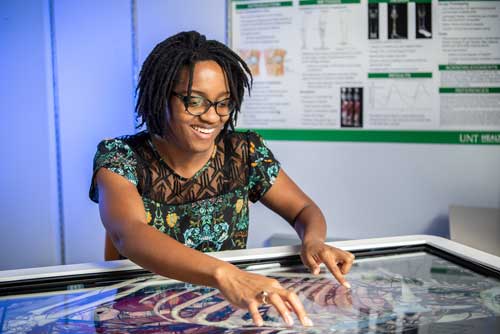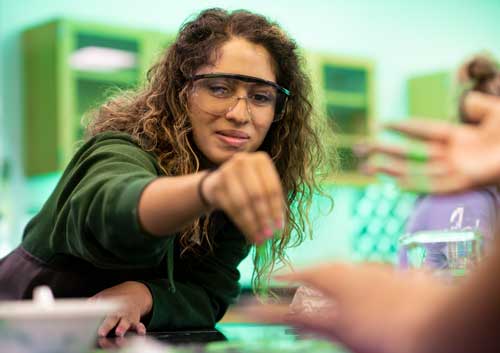Innovative Spaces
October 30, 2020
As UNT’s creative and scholarly footprint grows, so does the campus, which has seen the addition of new facilities that encourage collaboration and enable faculty, students and external research partners to conduct solutions-based research. Recent building projects — including the Center for Agile and Adaptive Additive Manufacturing (CAAAM) and a new Biomedical Engineering Building at Discovery Park, and the expansion of UNT’s presence in Frisco — not only create a pipeline for technology transfer and industry partnerships, but meet the demands of a changing workforce.
Standout Advanced Materials Facility
In 2019, UNT secured $10 million from the 86th Texas Legislature for the Center for Agile and Adaptive Additive Manufacturing (CAAAM). UNT launched the center at Discovery Park in 2018 under the umbrella of the university’s existing Additive Manufacturing Laboratory, and the expertise of its world-renowned faculty helped place the university at the forefront of this rapidly emerging field. UNT has developed one of the most advanced university research facilities in the nation for materials processing, manufacturing and analysis, allowing faculty and industry to collaborate to advance the science and application of materials processing and additive manufacturing across industries — from energy to aeronautics, automobile, biomedical and beyond.
Co-sponsored by UNT’s Division of Research and Innovation and the College of Engineering for the dual purpose of research and providing students with additional hands-on educational opportunities in this growing area, CAAAM is helping Texas develop a highly skilled workforce of engineers.
State-of-the-Art Biomedical Engineering Building

In Fall 2019, UNT opened its new $12.6 million Biomedical Engineering Building — a place where glass-walled open-concept labs and classrooms create a transparent and collaborative environment for cutting-edge research and learning. Biomedical engineering is one of the fastest-growing programs at UNT, increasing more than six-fold since its first class in 2014.
The 26,250-square-foot building located on UNT’s Discovery Park campus provides faculty and students with modern classrooms, research labs, facilities for microscopy, cell culture and optics, as well as teaching labs and a senior design lab. Inside research labs, faculty investigate exoskeleton technology that may someday help people with limited mobility. They develop nanotechnology and optics to diagnose cancer and biopolymers and flexible bioelectronics that may help doctors deliver medications and manage illnesses.
And the new facilities have allowed UNT to recruit new faculty and students to the biomedical engineering program — the department has added five new faculty in the last three years with research expertise in diverse areas such as biotechnology, medical imaging, flexible bioelectronics, and genetic and tissue engineering.
Growth in Frisco

The Texas Higher Education Coordinating Board voted in January 2020 to approve UNT’s creation of a Frisco-based branch campus — situated on 100 acres donated by the City of Frisco — that will provide core curriculum, upper-level and graduate courses. UNT’s collaboration on this branch campus with the City of Frisco, Collin County and Collin Community College will allow the university to continue to support innovative programs and partnerships in a location that is becoming synonymous with innovative growth.
Currently, UNT serves 2,900 students at its locations in Frisco — Hall Park and Inspire Park — as well as at the Collin Higher Education Center in McKinney. Inspire Park is a 50,000-square-foot building on 4.8 acres located in close proximity to the future campus. It operates as a business incubator for startup companies, including a new analytical chemistry lab, and offers space for classes, such as labs for students studying to become science educators.